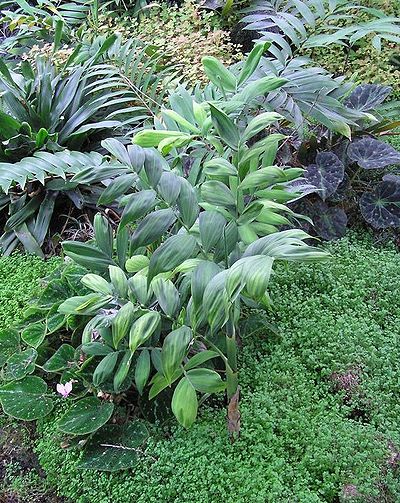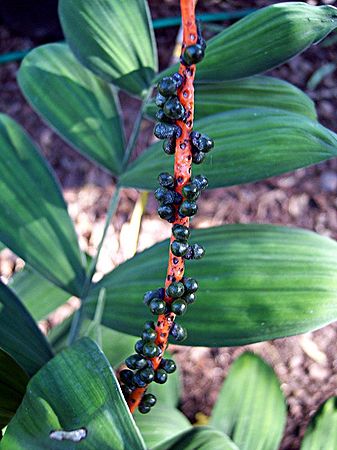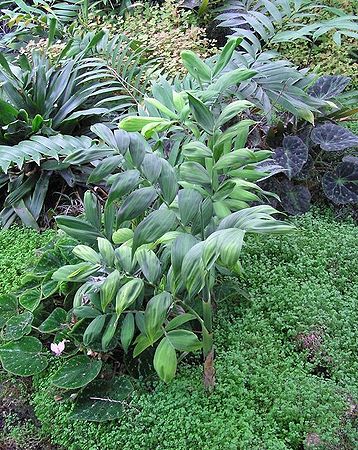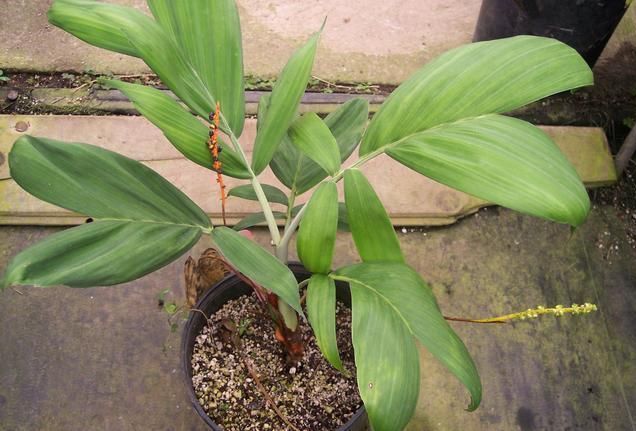Difference between revisions of "Chamaedorea adscendens"
Dypsisdean (Talk | contribs) |
Dypsisdean (Talk | contribs) |
||
| Line 20: | Line 20: | ||
}} | }} | ||
==Habitat and Distribution== | ==Habitat and Distribution== | ||
| − | ''Chamaedorea adscendens'' is found in Central America (GUATEMALA. Alta Verapaz. Peten. BELIZE. Toledo). It grows to an elevation of 700 m in moist or wet forest on the Atlantic slope on solid limestone. It is not widly distributed - occurring only on infrequent hillside locations. | + | ''Chamaedorea adscendens'' is found in Central America (GUATEMALA. Alta Verapaz. Peten. BELIZE. Toledo). It grows to an elevation of 700 m in moist or wet forest on the Atlantic slope on solid limestone. It is not widly distributed - occurring only on infrequent steep hillside locations near the summits. (Hodel) |
[[Image:Chamads0003.jpg|thumb|left|400px]] | [[Image:Chamads0003.jpg|thumb|left|400px]] | ||
==Description== | ==Description== | ||
| − | Chamaedorea ascenders is an unusually attractive small palm growing to a maximum height of 2.5 meters after many years. It is generally available from specialty nurseries. Its velvety textured grey-blue-green leaves are some of the thickest in the genus. Usually pinnate, some | + | Chamaedorea ascenders is an unusually attractive small palm growing to a maximum height of 2.5 meters after many years. It is generally available from specialty nurseries. Its velvety textured grey-blue-green leaves are some of the thickest in the genus. Usually pinnate, some bifid leaves are not uncommon, generally occurring on the younger individuals. |
Since it is a solitary palm, it is particularly stunning when planted as a small grouping. Such a display deserves a place in any garden where a grouping of small palms would make a good addition. | Since it is a solitary palm, it is particularly stunning when planted as a small grouping. Such a display deserves a place in any garden where a grouping of small palms would make a good addition. | ||
==Culture== | ==Culture== | ||
Revision as of 20:34, 25 November 2014
| Chamaedorea (kahm-eh-doh-REH-ah) adscendens (ahd-SEN-denz) | |||||||
|---|---|---|---|---|---|---|---|
 Photo-Seabreezenurseries.com, edric. | |||||||
| Scientific Classification | |||||||
| |||||||
| Synonyms | |||||||
|
| |||||||
| Native Continent | |||||||
|
| |||||||
| Morphology | |||||||
| |||||||
| Culture | |||||||
|
| |||||||
| Survivability index | |||||||
|
| |||||||
| Common names | |||||||
|
| |||||||
Contents
Habitat and Distribution
Chamaedorea adscendens is found in Central America (GUATEMALA. Alta Verapaz. Peten. BELIZE. Toledo). It grows to an elevation of 700 m in moist or wet forest on the Atlantic slope on solid limestone. It is not widly distributed - occurring only on infrequent steep hillside locations near the summits. (Hodel)
Description
Chamaedorea ascenders is an unusually attractive small palm growing to a maximum height of 2.5 meters after many years. It is generally available from specialty nurseries. Its velvety textured grey-blue-green leaves are some of the thickest in the genus. Usually pinnate, some bifid leaves are not uncommon, generally occurring on the younger individuals. Since it is a solitary palm, it is particularly stunning when planted as a small grouping. Such a display deserves a place in any garden where a grouping of small palms would make a good addition.
Culture
Warm, sheltered and moist. It will survive in mild Mediterranean type climates. Like most Chamaedoreas it benefits from a clean layer of mulch. Since it is found on limestone, appropriate pH and addition of lime may prove beneficial in certain growing situations. It is from a region which has sometimes prolonged drought conditions, and anecdotal reports from gardeners indicates it is indeed quite drought tolerant, especially for such a dainty tropical looking palm.
Comments and Curiosities
Chamaedorea are dioecious - having male, and female flowers, on separate plants.
Ascendens is a Latin word for ascending, apparently in reference to the inflorescences. However, the author did not specifically note whether it was referring to such.
- IMAGE GALLERY
External Links
References
Phonetic spelling of Latin names by edric.
Special thanks to Geoff Stein, (Palmbob) for his hundreds of photos.
Special thanks to Palmweb.org, Dr. John Dransfield, Dr. Bill Baker & team, for their volumes of information and photos.
Glossary of Palm Terms; Based on the glossary in Dransfield, J., N.W. Uhl, C.B. Asmussen-Lange, W.J. Baker, M.M. Harley & C.E. Lewis. 2008. Genera Palmarum - Evolution and Classification of the Palms. Royal Botanic Gardens, Kew. All images copyright of the artists and photographers (see images for credits).
Hodel, D.R.1992. Chamaedorea Palms, The Species and Their Cultivation. The International Palm Society.
Many Special Thanks to Ed Vaile for his long hours of tireless editing and numerous contributions.






















